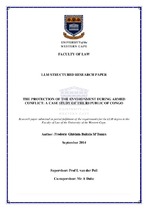| dc.contributor.advisor | van der Poll, Letetia | |
| dc.contributor.advisor | Dube, A. | |
| dc.contributor.author | M’Banza, Frederic Ghislain Bakala | |
| dc.date.accessioned | 2015-06-04T08:31:37Z | |
| dc.date.available | 2015-06-04T08:31:37Z | |
| dc.date.issued | 2014 | |
| dc.identifier.uri | http://hdl.handle.net/11394/4277 | |
| dc.description | Magister Legum - LLM | en_US |
| dc.description.abstract | The International Committee of the Red Cross/Crescent (ICRC) has been the only agency promoting the observance of the law of armed conflict. It has invested considerably in finding solutions to protecting people and regulates the means and methods of warfare. Throughout the development of the law of armed conflict, the protection of the environment was never the centre of focus. From the early 1868 Declaration of Saint Petersburg to the Hague Regulations of 1907, attention was given to weakening the military forces of the enemy and the right of the belligerents not to destroy or seize the enemy’s property, unless such destruction or seizure be imperatively demanded by the necessities of war. Through AP I, the basic principle of IHL was reaffirmed. The concepts of military necessity and proportionality became clearer, permitting only those acts of war which are proportional to the lawful objective of a military operation. Considering the cruelty experienced through the crises that occurred in the RC, it is therefore imperative for the administration to enforce their observation. In the light of the above background the aims of this research paper are to seek to explore the challenges that the current RC administration is facing in implementing IHL and IEL principles. In addition, the research paper will analyse the possibilities to promote the implementation of IHL and IEL instruments within the public domain, mostly the army, to dissipate any ignorance that occur. The International Court of Justice (ICJ) has also made it clear that an obligation rests upon states to take environmental considerations into account during armed conflict in so far as these relate to states’ military objectives | en_US |
| dc.language.iso | en | en_US |
| dc.publisher | University of the Western Cape | en_US |
| dc.subject | Armed conflict | en_US |
| dc.subject | Environment | en_US |
| dc.subject | Environmental rights | en_US |
| dc.subject | International Environmental Law (IEL) | en_US |
| dc.subject | International Humanitarian Law (IHL) | en_US |
| dc.subject | Military activities | en_US |
| dc.subject | Protection | en_US |
| dc.subject | Republic of Congo | en_US |
| dc.title | The protection of the environment during armed conflict: a case study of the Republic of Congo | en_US |
| dc.type | Thesis | en_US |
| dc.rights.holder | University of the Western Cape | en_US |

